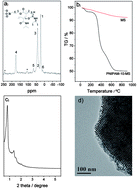Enhanced thermostability of enzymes accommodated in thermo-responsive nanopores†
Abstract
The crowded and hydrophobic microenvironment was created for immobilized enzymes via the thermally-initiated shrinkage of PNIPAM

* Corresponding authors
a
State Key Laboratory of Catalysis, Dalian Institute of Chemical Physics, Chinese Academy of Sciences, Dalian, P. R. China
E-mail:
yangqh@dicp.ac.cn, canli@dicp.ac.cn
Fax: +86-411-84694447
Tel: +86-411-84379552
b Graduate School of the Chinese Academy of Sciences, Beijing, P. R. China
The crowded and hydrophobic microenvironment was created for immobilized enzymes via the thermally-initiated shrinkage of PNIPAM

 Please wait while we load your content...
Something went wrong. Try again?
Please wait while we load your content...
Something went wrong. Try again?
J. Liu, S. Bai, Q. Jin, C. Li and Q. Yang, Chem. Sci., 2012, 3, 3398 DOI: 10.1039/C2SC21026F
To request permission to reproduce material from this article, please go to the Copyright Clearance Center request page.
If you are an author contributing to an RSC publication, you do not need to request permission provided correct acknowledgement is given.
If you are the author of this article, you do not need to request permission to reproduce figures and diagrams provided correct acknowledgement is given. If you want to reproduce the whole article in a third-party publication (excluding your thesis/dissertation for which permission is not required) please go to the Copyright Clearance Center request page.
Read more about how to correctly acknowledge RSC content.
 Fetching data from CrossRef.
Fetching data from CrossRef.
This may take some time to load.
Loading related content
